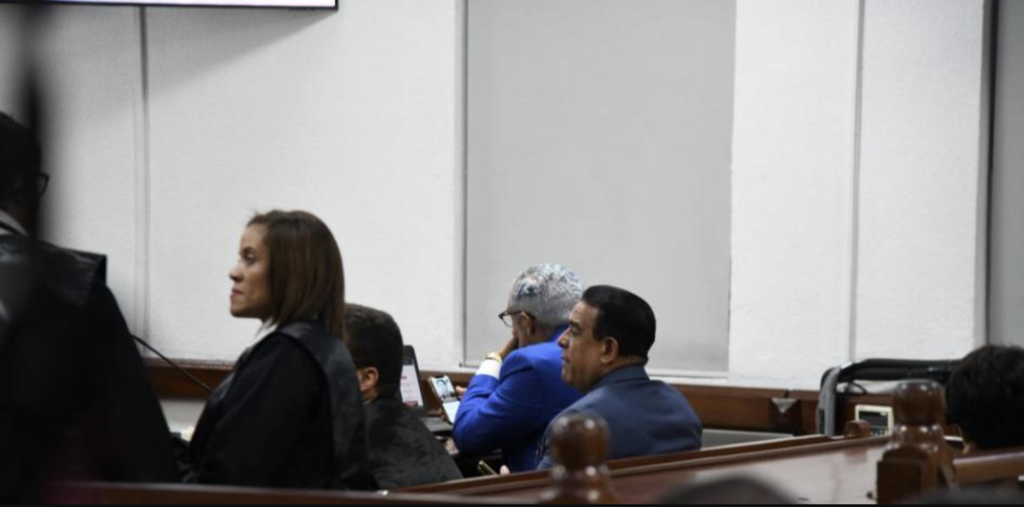
Juan Alexis Medina Sanchez, the brother of former President Danilo Medina was sentenced to seven years of prison, following the deliberations of the judges regarding a file of 3,455 pages involving 27 persona and 21 companies. The case was the first to be heard at the start of the government of President Abinader.
The Second Collegiate Court of the National District sentenced Juan Alexis Medina Sanchez to the seven years in prison for bribes, asset laundering and criminal association during the Danilo Medina administrations (2012-2016, 2016-2020). He was ordered to serve the sentence in the Najayo Men Jail in San Cristobal and to pay a fine of 150 minimum government wages. The case was known here as Anti Pulpo, in regards to the many tentacles of the accused. A court ruling would order that the Anti-Pulpo name could not be used in the future as official name for the case.
The judges Claribel Nivar Arias, Yissel Soto and Clara Sobeida chose to begin reading the sentence on Wednesday, 13 August 2025 at 10:50pm and concluded at 4:13am on Thursday. The official document with the sentence will be available on 25 September 2025.
Others convicted in the case were:
Ramón Brea Morel – 7 years
José Dolores Santana Carmona – 6 years
Wacal Vernabel Méndez Pineda – 5 years
Paola Mercedes Molina Suazo – 5 years
Carlos Martín Montes de Oca – 5 years
19 other persons who had been charged in the case were absolved. Former President Danilo Medina’s sister, also a high-profile accused in the same case, Carmen Magalys Medina Sanchez was discharged along with many other former government officials.
The state prosecutors had requested 20 years in prison, presenting evidence of fraud to the government for more than RD$5 billion.
Noted jurist Juan Hirohito Reyes, a former judge on the Supreme Court of Justice, said the ruling is historical, as reported in Hoy. He pointed out that Procurement Law 340-06, which covers government purchases of goods and services, has no criminal sanctions for violations. For Reyes, the former Supreme Court judge, this case sets a precedent in that it goes beyond the standard mode of proof that relied on material evidence.
As a result, Reyes has noted, the magistrates of the court used Law 448 that covers the crime of bribery as described in the Penal Code, and Law 155-17 on money laundering and criminal association to sentence the accused.
.
As an additional footnote, the judges also dismissed the cases against 13 other persons indicted in this case of massive government corruption for lack of sufficient evidence.
On the other hand, Participacion Ciudadana, the local chapter of Transparency International, observed that the sentences ranged from 3 to 7 years in prison, and came with multi-million dollar fines, confiscation of a large number of assets obtained through corruption, and permanent closure of companies used by the criminal network to defraud the state.
Participación Ciudadana (Citizen Participation), nevertheless, said it had hoped for higher sentences and the conviction of some who were acquitted, given the magnitude of the damage inflicted on society by people who took advantage of their family ties and positions in the state to amass large fortunes stolen from the public treasury.
Citizen Participation says that the mere fact that eight of the main individuals, of 27, involved were declared guilty is an unprecedented moral and social sanction and a significant step forward in the fight against corruption and impunity. “It is also a clear message for the entire country and for all governments that no one should consider themselves above the law, regardless of whether they are relatives, friends, or associates of those in power. This shows that there are now committed prosecutors and judges in the country willing to put an end to this harmful culture,” stated a press release from the civic watchdog organization.
The case now moves to the appeals phase.
Read more in Spanish:
Diario Libre
Diario Libre
Listin Diario
Listin Diario
Hoy
El Caribe
Participacion Ciudadana
18 August 2025

